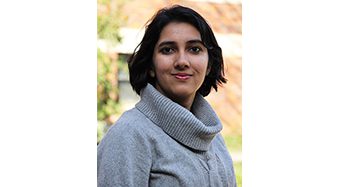Though Shilpi Mukherjee won’t be traveling to Germany this summer to participate in a prestigious international gathering of economists, the 5th-year Ph.D. student in the John E. Walker Department of Economics at Clemson University can hold her head high.

The in-person 7th Lindau Nobel Laureate Meeting on Economics has been postponed until 2021 when this year’s invitees will attend in Lindau, Germany. But Shilpi and a select group of young economists will be participating in a modified, virtual event that involves research presentations and a competition.
Lindau alumni and young scientists will meet at the alternative Online Science Days 2020 from June 28-July 1, as the 70th Lindau Nobel Laureate Meeting has been postponed due to the COVID-19 pandemic.
“It’s indeed an honor to have been chosen to be a part of this prestigious meeting of Nobel Laureates,” Shilpi said. “I am very much looking forward to the virtual event and hope to be one of those selected to present their research to the laureates.”
Shilpi is one of the young economists who has submitted her research abstract with hopes of presenting it at the online event. Abstracts are being reviewed and 24 of them will be presented this summer to the laureates in economics through virtual channels.
She is one of 373 young economists from 60 countries who were invited to the 7th Lindau Meeting on Economic Sciences. Because of the pandemic, this year’s invitees will be able to attend the next meeting in August of 2021.
The Nobel Prize in Economics is awarded annually for outstanding contributions in the field of economics. The Prize in Economic Sciences was established in 1968 and is awarded by The Royal Swedish Academy of Sciences, Stockholm, Sweden. Nearly 40 Nobel Laureates will be participating in this summer’s virtual event.
Shilpi’s research examines political polarization through social media channels. Through use of machine learning, Shilpi’s study analyzes tweets by Republicans and Democrats in the U.S. House of Representatives to determine how behaviors changed as the November 2018 elections approached and even a year after the elections.
“I used various machine learning techniques, especially Natural Language Processing, to create estimates in measuring polarization and partisanship because these are not clearly defined in the literature,” the Kolkata, India, native said. “Then, as I continue to work toward my final results, I am using traditional econometric techniques to analyze the estimates.”
During the online event, the 24 selected participants will have the opportunity to present their work to a global audience. Each presenter will have about 10 minutes to present their work to the Online Science Days 2020 audience and will have 5 minutes to answer questions and hear comments from those attending.
# # #
Get in touch and we will connect you with the author or another expert.
Or email us at news@clemson.edu

